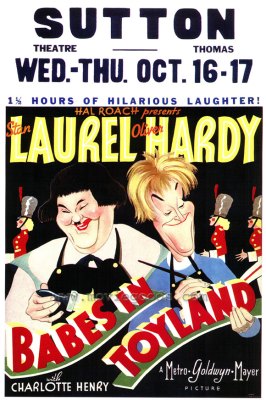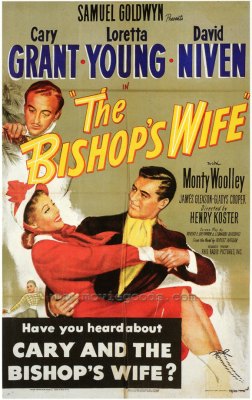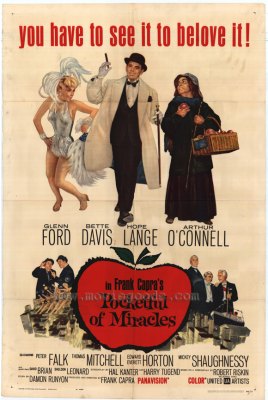| Reviews & Columns |
|
Reviews DVD TV on DVD Blu-ray 4K UHD International DVDs In Theaters Reviews by Studio Video Games Features Collector Series DVDs Easter Egg Database Interviews DVD Talk Radio Feature Articles Columns Anime Talk DVD Savant Horror DVDs The M.O.D. Squad Art House HD Talk Silent DVD
|
DVD Talk Forum |
|
|
| Resources |
|
DVD Price Search Customer Service #'s RCE Info Links |
|
Columns
|
|
|
M-G-M Holiday Collection (Babes in Toyland / The Bishop's Wife / Pocketful of Miracles)
Babes in Toyland (1934)
When the market for short comedies began to dry up in the early-1930s, producer Hal Roach was compelled to move Laurel & Hardy into feature length films, something Stan Laurel, the creative force behind the team and the uncredited director, editor, and chief gag writer of their movies, was resistant. Part of the problem was that Roach had some peculiar notions for the future of the team; he had a fondness for old-fashioned operettas, shoehorning Laurel & Hardy into such uneven productions as Fra Diavolo (1933) and The Bohemian Girl (1936).
Based on the Victor Herbert classic, Babes in Toyland was an expensive production by Hal Roach Studios standards, though modest compared to the average film produced by their then-distributor, MGM. With so much financially at stake for the little studio, Laurel's dismissive attitude about Roach's attempts to pull together a workable script created a rift between the two men that never fully recovered. Theirs was an acrimonious business-only relationship from this point on.
The film eventually made shows this compromise. A kind of proto-Wizard of Oz with its elaborate, fairy tale sets and ambitious make-ups, the budget nonetheless precluded shooting it in color, and the musical numbers are shot with a cheesy staginess suggestive of early talkies or maybe late-period Vaudeville, especially the hackneyed romantic scenes between Little Bo-Peep (Charlotte Henry) and Tom-Tom Piper (Felix Knight). Trusted L&H ally Charles Rogers directed their footage, while Gus Meins directed most everything else, and the line between them is pretty obvious. Laurel and Hardy's scenes, however, are excellent. Of their various attempts at this kind of would-be classy musical, this was by far the most successful.
Despite its flaws, Babes in Toyland deservedly remains one of the team's most fondly remembered films. It's also easily their scariest. The climax has the villainous Silas Barnaby (21-year-old Henry Brandon, later to play Scar in John Ford's The Searchers) unleashing an army of Bogeymen from his subterranean lair. These scenes are as unsettling as any of the classic 1930s Gothic horror films, so parents of small children take note. (****)
The Bishop's Wife (1947)
Like Babes in Toyland, The Bishop's Wife was a troubled production. A fantasy about an angel named Dudley (Cary Grant) coming to the rescue of an unhappy New York bishop, Henry Brougham (David Niven), whose efforts to build a cathedral risk compromising his values while straining the relationship with his loving wife, Julia (Loretta Young), first went before the camera under the direction of William A. Seiter. Something like a million dollars was spent before producer Samuel Goldwyn called it to a halt, replacing original Julia Teresa Wright (Shadow of a Doubt) with Young, and director Seiter with Henry Koster. Later still Billy Wilder and frequent collaborator Charles Brackett were brought in to pen some additional scenes after preview audiences reacted negatively to certain aspects of the film.
The most fundamental change, however, involved casting. In the film originally shot, Grant played the bishop and Niven the angel, and when production resumed the two switched roles. Niven would have been just fine as Dudley, but it's hard to imagine Grant as the tortured bishop, jealous of his wife's affection toward their unusual visitor.
The film that resulted is a real charmer, and though Grant reportedly was quite reluctant to play Dudley, it became one of his most fondly remembered roles. In fact, it's quite different from anything else he ever attempted, a role subtly but far removed from his usual screen persona. Like the hero of Wim Wenders' later Wings of Desire Grant's Dudley is an angel with yearnings for mortal happiness and the love of a woman, though the Production Code (rather than a deliberate attempt by the screenwriters) barely hints at this for most of the film, bringing it out in the open only near the end. This arms-length approach actually helps the film; for most of the picture, Grant's character seems to enjoy his heavenly duty. Grant's understated but confident performance does nearly the impossible: you completely accept Dudley as a character, and forget about Cary Grant, movie star.
The picture's production problems likely had to do with the fact that its charms simultaneously lack dramatic conflict. The fun and sweetness of the picture is watching Grant's angel working his little miracles and, chiefly, bringing happiness back to the bishop's home and, especially, back into his Julia's life. There's never any doubt that their problems will be solved but the filmmakers must have felt some sort of conflict was necessary or there'd be no story. And so this unusual love triangle was cooked up along with a subplot involving a bitter old woman (Gladys Cooper) whose funding of the bishop's cathedral comes with a price: she wants to turn the church into a memorial to her late husband. This latter story is resolved with a subtlety lacking in Frank Capra's counterpart, Lionel Barrymore's Henry F. Potter in It's a Wonderful Life and is quite touching, partly because of what it doesn't show. The love triangle aspects, however, don't really work, and tend to make Niven's character seem even more petty and unlikable than is necessary.
For the most part, however, The Bishop's Wife is delightful. Though the film has its share of trick shots involving Dudley working his magic, the best scenes are little moments that are effective because of the acting and writing, not the special effects. The film opens, for instance, with angel Dudley helping a blind man across a busy street. Cars slam on their breaks to avoid hitting them as Dudley calmly walks the man across, with the blind man oblivious to the extreme danger around him. It's suggested that at this point Dudley is invisible, that only the audience can see him. Later there's a big set piece where Dudley takes Julia (as well as their cab driver, played by James Gleason) ice-skating. His heavenly powers enable them to skate with a grace of an Olympic medalist, but Koster admirably doesn't overdo it; there are no real acrobatics thus keeping it within the realm of believability. (**** 1/2)
Pocketful of Miracles (1961)
Director Frank Capra's last completed feature is a remake of an earlier triumph, 1933's Lady for Day, 40 minutes longer and here singularly out of step with changing tastes. Glenn Ford stars as Dave "the Dude" Conway, a soft-hearted former bootlegger poised to take over the entire New York territory in a deal brokered with syndicate head Steve Darcey (Sheldon Leonard). However, Dave the Dude is a clinically superstitious man who depends upon the good luck apples of alcoholic street peddler Apple Annie (Bette Davis).
But she's just learned that her long-estranged daughter, Louise (Ann-Margret in her film debut), is engaged to Carlos Romero (Peter Mann), the son of Count Alfonso (a good though bizarrely miscast Arthur O'Connell), bona fide European royalty. Apple Annie, not wanting to admit to living in the gutter, as it were, has for years been sending letters on the stationary of a ritzy hotel, claiming to be a member of high society. Believing that her deception will ruin her daughter's life and her own relationship with her, Apple Annie goes on a bender.
Panicked, Dave the Dude cooks up an elaborate ruse. Borrowing an associate's penthouse at the hotel, he transforms Apple Annie into a lady, installing a sympathetic butler (Edward Everett Horton, in a supremely delightful performance) and pool shark "Judge" Henry G. Blake (Thomas Mitchell) as her husband.
The film was based Damon Runyon's Madame la Gimp, the first Runyon adaptation since Guys and Dolls (1955). Had Capra's film been made five years earlier, it might have capitalized on the success of that film, but by 1961 the picture's cast of loveable (and singularly non-violent) gangsters seemed hopelessly anachronistic in an era of The Untouchables, the new Mafia and Jimmy Hoffa. Its Runyon-esque elements have been toned down somewhat but are inconsistent. Glenn Ford's Dave the Dude is more cerebral and realistically compulsive about his need for Apple Annie's apples, but also less dynamic and larger-than-life as perhaps he needs to be. Capra wanted Sinatra or Dean Martin but couldn't get them (though Frank would charmingly cover the film's title song) and Ford stepped in to co-produce the film. He delivers a smooth, polished performance, but it's at odd with the more typically Runyon-esque playing of Peter Falk (funny as his exasperated right-hand man) and Mickey Shaughnessy's broad limo driver.
Bette Davis, one year prior to revitalizing her sagging career with What Ever Happened to Baby Jane? is also quite good. Made up (by Wally Westmore) with a shower of freckles and a grey fright wig, she's like a benign Wicked Queen from Snow White, very believable as a tortured drunk. Unfortunately, once transformed the character has little to do but fret that her big deception will be discovered, and her playing descends into typical Capra-corn-ness.
But the film's thick layer of sentiment almost works; throughout the film are little flashes of genuinely earned emotion. Part of this is because of the uniformly excellent leading performances, as well as from the all-star list of great character actors, many in tiny parts: Barton MacLane, John Litel, Jerome Cowan, Frank Ferguson, Fritz Feld, Ellen Corby, Benny Rubin (who has a fine comic bit), Jack Elam, Doodles Weaver, plug-ugly Harry Wilson. (***)
Video & Audio
The big news is that Babes in Toyland looks fantastic. Previously available on DVD only as gray-market releases by Passport and Goodtimes, among others, this authorized release really sparkles. I've seen the film a dozen times over the years, but no previous release even comes close; it's up to the level of Fox's recent Charlie Chans and Sony's new boxed set of early Three Stooges comedies, all of the same vintage. The film is also complete with its original title, the MGM logo, etc., and runs its original length (TV syndication and previous home video versions were cut by as much as nine minutes.) The mono audio is also cleaner than this reviewer has heard before. Optional English, Spanish, and French subtitles are included.
Conversely, The Bishop's Wife and Pocketful of Miracles are no Christmas gifts for fans of those films; both use transfers dating back to 2001. The Bishop's Wife looks okay; it's softer and dirtier (with reel change cues) and darker than it need be, but it's an acceptable presentation, I guess. There's no excuse for Pocketful of Miracles, however: it's the same ugly, 4:3 letterboxed transfer used before. The image is very grainy and dirty throughout, second-rate all the way. There was an opportunity here for MGM/Sony to upgrade the transfer but they opted out, a shame. Pocketful is English mono (wasn't this a stereo release originally?) with optional Spanish track and French and Spanish subtitles; Bishop's Wife adds a French track to the mix.
Extra Features
The only supplements are trailers: The Bishop's Wife should definitely be seen, as almost all of it is original footage showing Cary Grant, Loretta Young, and David Niven walking around the Goldwyn lot on Santa Monica Boulevard in Hollywood, talking about the film's trailer. The unintentionally hilarious trailer for Pocketful of Miracles (4:3 matted) is also worth a look. Ed Sullivan agreed to plug the film in an on-camera introduction shot on Broadway, but throughout the famous columnist/TV host seems to be staring straight at the emergency exits, never at the camera/theater audience. An unfortunate graphic boasts, "Frank Capra, the man who gave you 'A Hole in the Head'...!"
Parting Thoughts
If you don't already own two or more of these films and, especially, if you're a Laurel and Hardy fan, M-G-M Holiday Collection is worth its modest price. The transfers are great, okay, and pretty bad, but two of the movies are excellent and the other isn't bad, and Babes in Toyland has never looked better. Recommended.
Film historian Stuart Galbraith IV's most recent essays appear in Criterion's new three-disc Seven Samurai DVD and BCI Eclipse's The Quiet Duel.
|
| Popular Reviews |
| Sponsored Links |
|
|
| Sponsored Links |
|
|
| Release List | Reviews | Shop | Newsletter | Forum | DVD Giveaways | Blu-Ray | Advertise |
|
Copyright 2024 DVDTalk.com All Rights Reserved. Legal Info, Privacy Policy, Terms of Use,
Manage Preferences,
Your Privacy Choices | |||||||

















